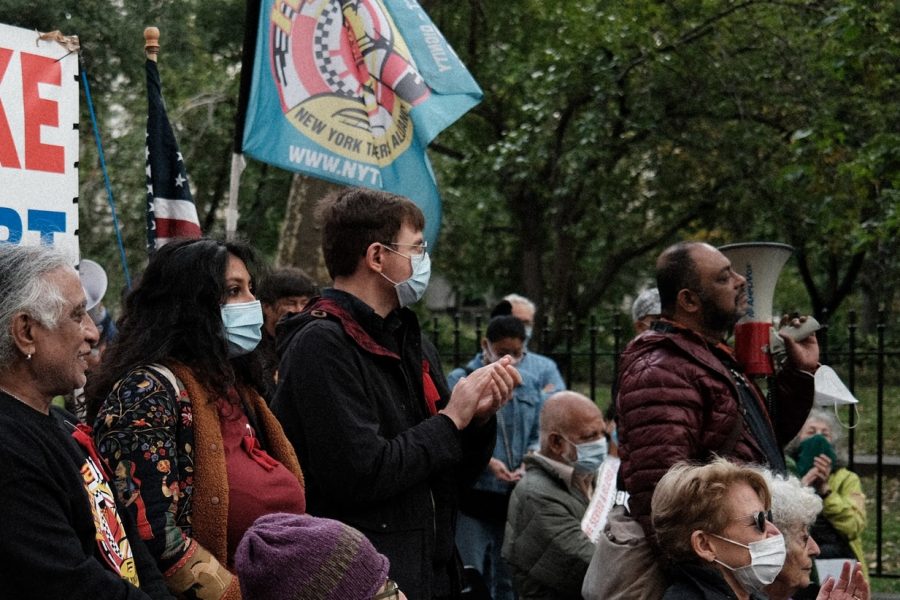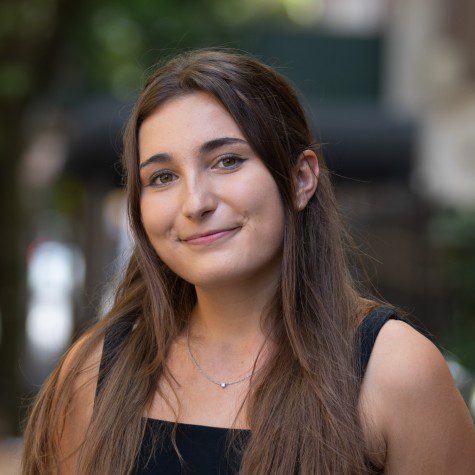NYU student hunger strikes for 52 hours in solidarity with taxi drivers
Karishma Chari, who ended her fast on Tuesday morning, participated in the New York Taxi Workers Alliance’s hunger strike alongside taxi drivers campaigning for debt relief and workers’ rights.
CAS junior Karishma Chari (second from left) joined the New York Taxi Workers Alliance hunger strike for 52 hours in solidarity with the taxi drivers. Taxi drivers are calling for debt forgiveness and advocating for workers’ rights. (Photo by Hai Tu)
November 3, 2021
For two and a half days, Karishma Chari didn’t eat. Her hunger strike was an act of solidarity with taxi drivers who reached 15 days on hunger strike Wednesday as part of the New York Taxi Workers Alliance’s protests for partial debt forgiveness and workers’ rights.
Chari, a CAS junior studying public policy and a campaign coordinator with the NYU chapter of the Young Democratic Socialists of America, began a 52-hour hunger strike on Sunday after frequently visiting strikers for several weeks. She said that though she has no direct connection to taxi drivers or the strike, she undertook the hunger strike as an act of solidarity.
“Solidarity and strike solidarity has always been something that’s very important to me,” Chari said. “It wasn’t even a question of ‘should I go on hunger strike?’ My question was, ‘how long should I go on hunger strike?’”
https://twitter.com/kcharizard_/status/1454919694352363520?s=20
Several other NYU students have been attending the protests for taxi workers’ rights. CAS junior Dylan Campana, a member of NYU’s YDSA chapter, has been visiting the picket line since October.
“I find the situation that the NYTWA in to be incredibly upsetting since workers are committing suicide and are crushed under massive amounts of debt because of the medallion system,” Campana said. “The fact that their crushing debt could be easily resolved by the city makes me more motivated to support them.”
Chari also said that, as a first-generation Indian immigrant, she feels a closeness with the taxi drivers on strike — over 80% of whom are immigrants.
Medallions — the licenses required to operate a yellow taxi in New York City — were once considered valuable investments for drivers. In 2014, taxi medallion prices hit $1 million. However, the price has since crashed to about $100,000, leaving taxi workers with an average of $600,000 of debt. The rise of ride-hailing apps like Uber and Lyft and the financial impact of the COVID-19 pandemic have contributed to this collapse.
As a result, many drivers and their families are struggling with financial troubles and health worries. The NYTWA’s current priorities are debt relief for drivers and addressing arduous working conditions that include long shifts and unsustainably low fares.
Chari said that the physical effects she has felt as a result of her hunger strike pale in comparison with those felt by other participants, many of whom are much older than her.
“We have taxi drivers that are well into their 60s and 70s with so many underlying conditions,” Chari said during her hunger strike. “I’m only on my 36th [hour] and I’m already getting a migraine.”
Solidarity! https://t.co/UXhgoMjA7B
— NY Taxi Workers (@NYTWA) November 2, 2021
As of Oct. 31, 11 “veteran strikers” had been on hunger strike for 12 consecutive days, according to the NYTWA. Even outside of the strike, hunger is often a daily concern for drivers grappling with enormous debts.
“These drivers are so acquainted with the fear of not being able to get food because of this very crisis, because their paycheck just goes towards paying off medallion debt,” Chari said. “It’s a very personal struggle for a lot of these people.”
Jaslin Kaur, an activist, former city council candidate and daughter of a taxi driver, decided to get involved in city politics so she could help end the medallion debt crisis. At a drivers’ protest on Oct. 20, she spoke about how food insecurity impacts taxi drivers in the city.
“I remember what it was like to be afraid to go hungry, and I remember what it was like to be afraid to lose my home,” she said.
Chari said that NYU’s proximity to taxi drivers and other essential workers in New York City makes it students’ duty to get involved with protest and strike efforts.
“They’re such an integral part of the city and there’s such an intense refusal from the government and other administrations to actually support these drivers,” she said. “A lot of times when they’re advertising our school and trying to get new applicants, they talk about the lure of New York City a lot. One of the main symbols of this city is the yellow cab. Not just any cab, specifically the medallion-owned cab.”
Campana said it is the responsibility of students at the university to take a greater interest in local issues and politics.
“I want the NYU community to know that all around them, there are active systems of oppression and exploitation that constitute the city that they came here to explore and learn in,” Campana said. “As students living in NYC, it is their duty to support the local people that make up our city, and therefore the struggle of taxi drivers.”
Contact Abby Wilson at [email protected].



























































































































































